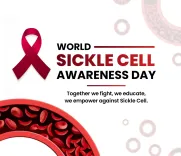Can Personalized Cancer Vaccines Slow Tumor Recurrence?

Synopsis
Key Takeaways
- Personalized vaccines can help prevent aggressive tumour recurrence.
- Research is focused on triple-negative breast cancer and melanoma.
- Utilizes engineered pyroptotic vesicles for targeted treatment.
- Localized treatments reduce systemic side effects.
- Study published in Nature Nanotechnology.
New Delhi, June 20 (NationPress) Researchers in the United States have discovered that creating personalized vaccines could be pivotal in preventing the recurrence of aggressive tumours.
This investigation, led by a team from the University of Wisconsin-Madison, concentrated on triple-negative breast cancer and melanoma, a highly lethal form of skin cancer.
Currently, the long-term outlook for patients suffering from these cancers remains relatively bleak.
This is primarily due to the tendency of these diseases to reappear after initial treatments aimed at tumour removal.
However, utilizing mouse models, the research group was able to significantly slow down tumour recurrence.
Quanyin Hu, a professor at the UW–Madison School of Pharmacy, stated that this method could theoretically be utilized for any cancer known to recur, such as pancreatic cancer and glioblastoma, which is the most common and highly aggressive brain tumour.
The personalized vaccine strategy is a continuation of the team's recent finding regarding pyroptotic vesicles—tiny sacs that contain the remnants of cancer cells undergoing programmed cell death.
Importantly, the remnants found within these microscopic sacs comprise antigens specific to the tumour, along with various molecular fragments that can assist in directing immune cells to locate and suppress any lingering cancer cells post-surgery.
In the latest study, published in the journal Nature Nanotechnology, the team engineered these vesicles to carry a drug that stimulates the immune system.
They subsequently incorporated these engineered vesicles into a hydrogel that can be implanted in the cavity left after a tumour is surgically excised.
Using a mouse model for melanoma and two different models for triple-negative breast cancers—including one with a human-derived tumour—the researchers evaluated their novel approach against various other cancer vaccine strategies currently under investigation.
The mice treated with the hydrogel loaded with their engineered vesicles demonstrated significantly longer survival rates compared to others.
"Our approach exhibits a far more robust immune response compared to other methods," Hu remarked.
Another significant benefit of this technique, according to the researchers, is its localized nature.
Hu elaborated that by applying the engineered vesicles directly at the site of the excised tumour, the risk of systemic side effects is greatly minimized, in contrast to existing treatments.









